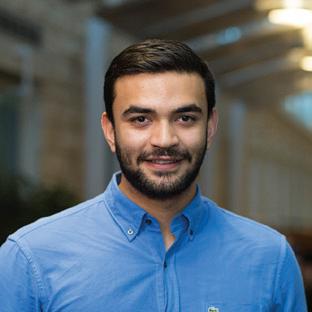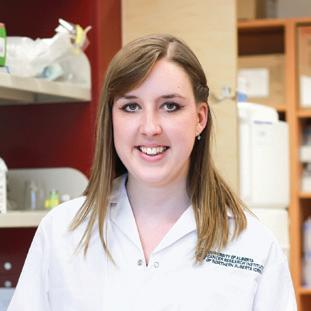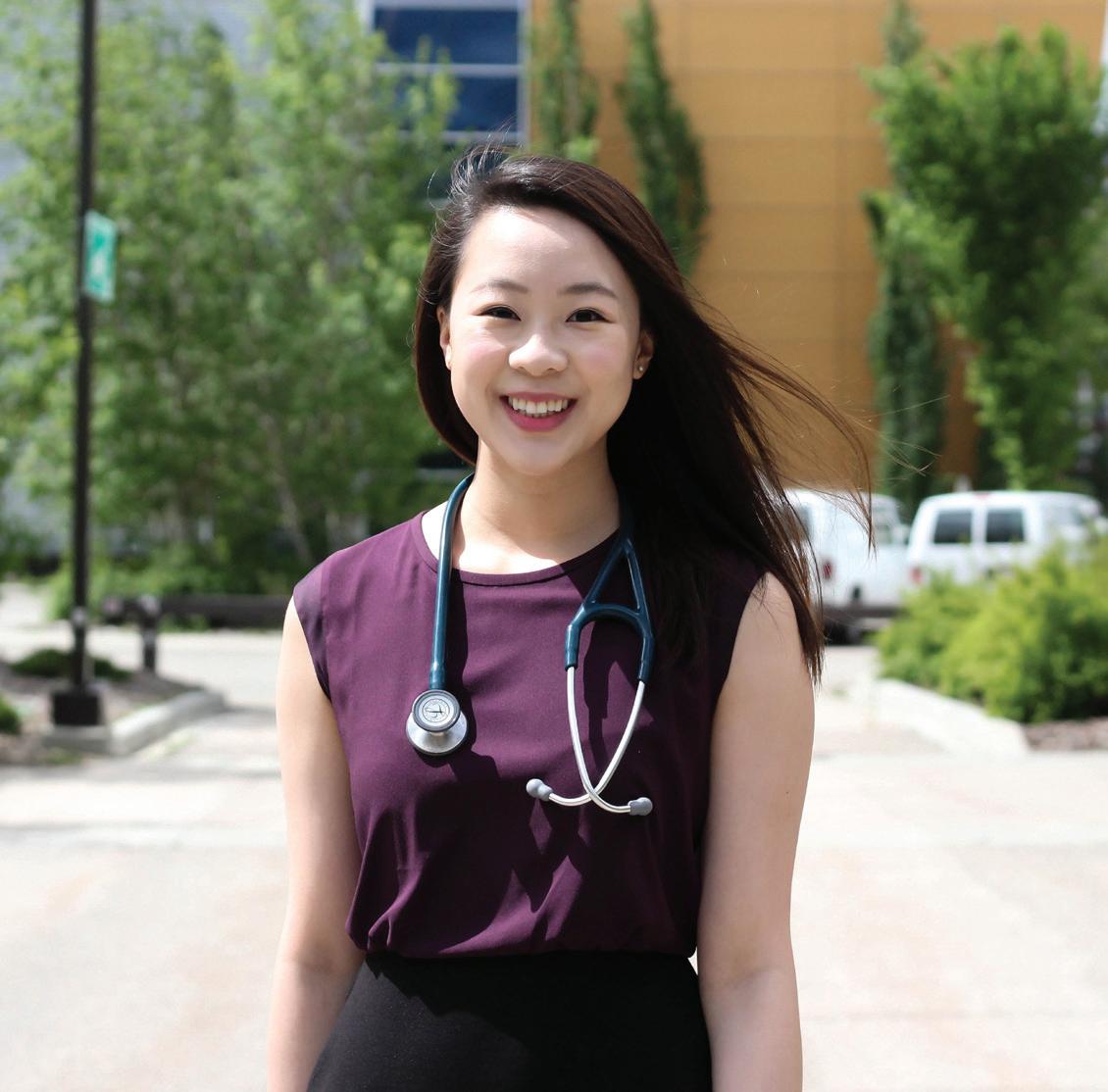
6 minute read
Learners as leaders
Meet three learners who are leading lights in their fields
Iain Sander
Advertisement
MD STUDENT AND RHODES SCHOLAR
AS AN ENGINEERING undergrad at Queen’s University, Sander co-designed a device for swimmers with disabilities. But it was coaching Special Olympians that ignited his interest in medicine.
As a 2018 Rhodes Scholar at Oxford University, Sander will study orthopedic biomechanics and examine the musculoskeletal system, seeking root causes of mobilityrelated disorders. After his two-year sojourn, he will finish medical school at the University of Alberta and hopes to specialize in physiatry.
“When people say, ‘What do you want to do 10 years from now?’ I say, ‘I’ll still be in school.’ But that’s OK. I love it.”
Mackenzie Coatham

UALBERTA’S FIRST PHD IN OB/GYN
RECRUITED THROUGH THE
graduate program in Maternal and Child Health (MatCH), Mackenzie Coatham is an award-winning endometrial cancer researcher and the first PhD student in obstetrics and gynecology at University of Alberta.
Coatham is passionate about the importance of basic science research in advancing women’s health. Her biochemistry background makes her a valuable asset in Cancer Research Institute of Northern Alberta (CRINA) co-director Lynne Postovit’s lab and she volunteers monthly to help curate the CRINA e-newsletter.
“As scientists, I think it is important for us to be accountable to society and disseminate our findings to our fellow researchers so that the entire field can keep progressing,” said Coatham.
Danielle Clark

MSC STUDENT AND DENTAL HYGIENE AWARD WINNER
DANIELLE CLARK, RDH, BSc DH, is the first Canadian student to win the American Dental Education Association (ADEA) Crest Oral-B Scholarship for Dental Hygiene Students Pursuing Academic Careers Award.
Currently, she is practising dental hygiene at the U of A School of Dentistry’s Oral Health Clinic and is a clinical instructor within the division of periodontology. Her research, focused on the role of loricrin (a protein) in aggressive periodontal disease, has her publishing in leading peerreviewed journals, attending conferences and lecturing around the world.
“More work needs to be done in terms of knowledge translation in order to see high-risk populations get the care they need.”
COMING TO TERMS WITH A SERIOUS ILLNESS HAS MADE HER A MORE EMPATHETIC DOCTOR, SAYS MICHELLE HUIE

Why vulnerability may be the best medicine
Through accepting and treating her depression, Michelle Huie discovered the kind of doctor she wanted to be.
AUTHOR
LESLEY YOUNG
ORIGINAL STORY
FOLIO
PHOTO BY
MELISSA FABRIZIO
EDITED BY
SASHA ROEDER MAH
CALGARIAN MICHELLE HUIE started first-year medical school at the University of Alberta like every other student: enthusiastically. She knew that acceptance into the competitive program is a milestone in and of itself. At first, Huie—who was voted class representative by her peers— appeared outgoing and energetic. But by mid-year, those who knew her well, such as her boyfriend, were very concerned about her. She insisted she was fine. Huie told herself that concentrating in class wouldn’t always feel like running in water. That sleeping and eating would once again be pleasurable activities. That she wouldn’t be standing on
the street corner, weighed down by her heavy backpack, thinking absentmindedly, “I could just step out in front of this bus...”
“I was very sick,” she admitted. “I tried to mask it. Nobody else seemed to be struggling. And with medical students, you are with a cluster of people who strive to overcome obstacles and push past things. Everyone is a rock star, so I felt like I couldn’t show I was struggling.”
Huie’s depression affected her marks. When she received the devastating news that if she wanted to be a doctor, she would have to redo her first year— an allowance the faculty makes in rare cases—she realized she needed help.
Huie decided to get counselling from the Office of Learner Advocacy & Wellness (LAW) in the Faculty of Medicine & Dentistry. LAW was established seven years ago to provide support and advocacy to undergraduate and postgraduate learners within the faculty. “In 2016, we had just over 3,000 visits from undergraduate and postgraduate learners, and about 20 per cent of those visits were counselling appointments,” said Jaleh Shahin, LAW’s psychologist.
“Medicine is a demanding program,” said Shahin, “and learners generally share a high drive to succeed and are very ambitious. The combination of some common personality traits and a demanding environment can increase the risk for mental health challenges for some learners.” not only accept her illness, but also slowly begin the process of managing its symptoms. She also took actions to help her recovery, including exploring aspects of herself beyond university life. She joined intramural volleyball and became a mentor to a 12-year-old girl in the Boys and Girls Club. “It was very healing,” she said. “I think she inadvertently mentored me as much as I mentored her.”
Huie also got involved with a camp that mentored underprivileged high school students and exposed them to medical school. “I didn’t realize it at the time, but I was choosing activities that really interested me, and they were all leading me towards my specialty—pediatrics. I discovered how important youth and advocacy work was to me.”
A few weeks before Huie returned to first-year orientation for what she jokingly dubs “Year 1.5,” she told a few friends about her illness.
“It was surprising how many students said, ‘It could have been me.’ In the end, I couldn’t have felt more supported.”
By the end of a year that involved studying hard, counselling sessions and sharing her story in what would prove to be the very empowering first student-led Monologues in Mental Health coffeehouse, Huie was feeling more like herself. “I remember thinking, ‘OK, I’m back.’ I saw a bright light at the end of the tunnel.”
She entered clerkship, which moved her out of the classroom and into direct interactions with patients. That was when she felt the transformative powers of her personal experience combine with her education, and what kind of doctor she would become.
“A lady came in teary eyed, confused as to why she never wanted to leave the house. I asked my preceptor if I could have a few minutes to sit down with her and hash it out. In that moment, I realized how my own personal experience changed how I reacted to the situation.”
She added, “Being sick is humbling. It makes you realize how it impacts people’s lives. Because doctors see illness every day, it’s so important for them to remember every illness is unique to every patient. Patients often wait weeks or months to see a doctor, and their encounter impacts their care as much as the procedure or medication. A doctor’s empathy and compassion in itself is healing.”
For outstanding compassion in care during her clerkship, Huie was awarded the Dr. Tom Ranieri & Dr. Alf Conradi Excellence in Compassionate Care Scholarship.
Today, Huie, ’17 MD, is working through her pediatrics residency at the U of A and she’s managing her health by clarifying her identity outside of school, eating and exercising well, learning to say no and, perhaps most importantly, opening up to others and sharing her experiences, as often as she’s comfortable.










